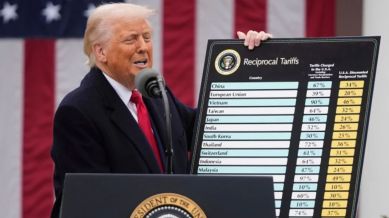Stay updated with the latest - Click here to follow us on Instagram
Trump’s ‘Liberation Day’ tariffs halted by US Court of International Trade
Trump tariffs court ruling: The verdict by three-judge bench comes after lawsuits argued that Trump exceeded his authority, made US trade policies dependent on his whims and unleashed economic chaos.

US-China tariff agreement news: A federal court on Wednesday dealt a significant blow to US President Donald Trump’s sweeping tariff agenda, invalidating his “Liberation Day” trade orders and casting doubt over his authority to impose unilateral tariffs under emergency powers.
In a sharply worded ruling, the US Court of International Trade found that Trump had overstepped his executive authority by invoking the International Emergency Economic Powers Act (IEEPA) to justify a broad array of global tariffs announced last month. The panel of judges said the White House had acted “contrary to law.”
monthly limit of free stories.
with an Express account.
“The Worldwide and Retaliatory Tariff Orders exceed any authority granted to the President…to regulate importation by means of tariffs,” the court wrote in its decision, effectively blocking the implementation of one of Trump’s most ambitious trade actions to date.
The decision threatens Trump’s economic policy, which he has repeatedly framed as an effort to combat “unfair trade practices” and restore domestic manufacturing through aggressive, and at times, unpredictable use of tariffs.
The White House has criticized the ruling as an example of judicial overreach. “It is not for unelected judges to decide how to properly address a national emergency,” a spokesperson said. “President Trump pledged to put America First, and the Administration is committed to using every lever of executive power to address this crisis and restore American greatness.”
The ruling comes after two separate lawsuits were filed in May. One case, led by the wine importer VOS Selections and four other American companies, argued that the tariffs had caused direct harm to their businesses. Another suit, brought by 12 states led by Oregon, said the levies would drive up costs for essential goods procured by public agencies.
During hearings in New York, government attorneys argued that Trump’s tariff regime had led to international negotiations and that any legal block would severely damage US leverage on the global stage. “An injunction would completely kneecap the president,” said Justice Department lawyer Brett Shumate during the Oregon hearing.
However, Judge Jane Restani pushed back on the administration’s framing. “The court cannot for political reasons allow the president to do something he’s not allowed to do by statute,” she said.
The administration had cited the IEEPA as the legal foundation for the April 2 tariff order, which was issued after Trump declared a national emergency. The President’s lawyer argued that unfair trade practices constituted an “unusual and extraordinary threat” to the American economy and national security.
The White House reiterated that argument in a statement Wednesday. “Foreign countries’ nonreciprocal treatment of the United States has fuelled America’s historic and persistent trade deficits,” the spokesperson said. “These deficits have decimated American communities, left our workers behind, and weakened our defence industrial base — facts that the court did not dispute.”
Despite that, the court went against the White House and stated that the emergency statute does not grant the President the authority to impose tariffs without congressional authorization. “This is an unprecedented and unlawful expansion of executive authority,” said Jeffrey Schwab, the attorney representing the group of businesses in the case.
In recent days, however, the White House had already begun softening some of its tariff measures amid mounting international and domestic pressure. Trump delayed a threatened 50 per cent tariff on European goods after a call with European Commission President Ursula von der Leyen.
The United States and China, meanwhile, have agreed to a 90-day mutual reduction in tariffs, marking a temporary easing of trade tensions. The agreement exempts smartphones and other high-tech electronics from China.